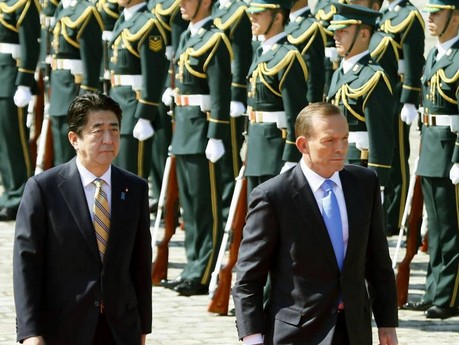 inister Shinzo Abe and Australian Prime Minister Tony Abbott agreed on a free trade pact Monday in Tokyo, ending seven years of negotiations.
inister Shinzo Abe and Australian Prime Minister Tony Abbott agreed on a free trade pact Monday in Tokyo, ending seven years of negotiations.“Today’s general agreement has an historic significance for the two nation’s efforts to establish closer ties,” Abe said during a joint press conference Monday.
Abbott described the opportunity as “a marvellous and historical day.”
With the agreement, Australia becomes the first major farm-exporting nation to reach an FTA deal with Japan.
Abe and Abbott are expected to formally sign an FTA agreement this summer. If everything goes smoothly, the accord is expected to take effect in 2015.
The agreement will have positive implications for the Australian horticulture industry, with a range of fruit and vegetable commodities flagged for tariff elimination.
Fruit Growers Victoria deputy chairman Gary Godwill says the agreement, which eliminates tariffs on a range of canned fruit and vegetables, puts them on a level playing field with other players in the market.
'Access to the Japanese market is a wonderful thing,' he told AAP on Tuesday.
Victorian fruit growers have been under pressure after canning company SPC Ardmona tried - and failed - get a federal government bailout earlier in the year.
Mr Godwill said real access to key Asian markets was important.
AUSVEG, the National Peak Industry body representing Australia’s vegetable and potato growers has welcomed the announcement.
“Australian horticulture the potential for significant trade growth in Japan, so to see reduced tariffs for products like carrots, asparagus and cabbage will mean that it will be easier for Australian growers to get these products onto the shelves of Japanese supermarkets,” said AUSVEG Spokesperson Hugh Gurney.
“This agreement will further assist the Australian vegetable industry to establish trade in Asia, with market access for a greater range of vegetables the next priority for industry in order to take advantage of lower tariffs,” said Mr Gurney.
Once brought into effect, the FTA will see the elimination of the current three per cent tariff on products like carrot, asparagus and cabbage.
In 2012-13, $51,126,066 AUD of asparagus was exported from Australia to Japan.
“When you’re talking about over $50 million dollars, a three per cent reduction in costs for accessing Japanese consumers equates to a significant amount of money that an Australian asparagus grower can choose to reinvest into their business.”
Other horticultural products will also see benefits from the deal, with canned tomatoes and vegetable juice both identified to have their current tariffs phased out over a five year period.
“AUSVEG enjoys a close working relationship with Austrade and it is hoped that now the FTA has been announced, more and more Australian vegetable growers will explore the Japanese market,” said Mr Gurney.
On 22 June this year, AUSVEG is hosting an Exporting to Japan Symposium in Cairns, which will aim to teach Australian vegetable growers how to negotiate export deals with Japanese customers.
“Trade with Asian markets will be essential if the Australian vegetable industry is going to expand profitably, so the announcement of this FTA is welcome and represents a great opportunity for our local growers, who grow some of the best produce in the world,” said Mr Gurney.
The FTA still requires approval from the parliaments of both countries before these conditions can take effect.





